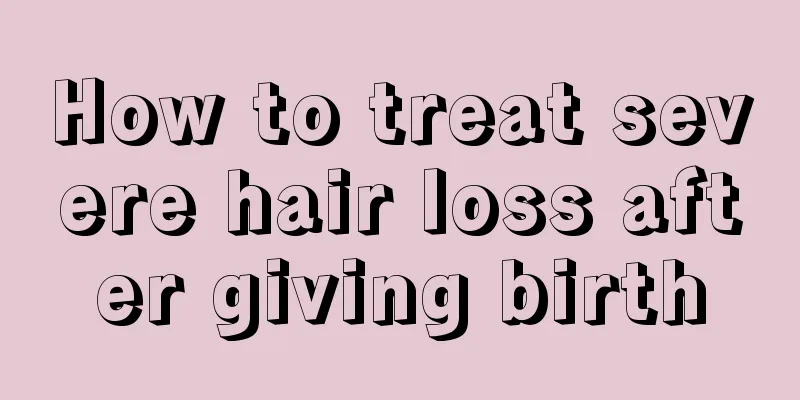How to treat severe hair loss after giving birth

|
Children are the most precious treasures in their parents' lives, and having children is an indispensable thing in every woman's life. However, many female friends experience severe hair loss after giving birth. Why does this happen? How to treat severe hair loss after giving birth? Let us take a look at the authoritative opinions of relevant experts. During pregnancy, the amount of estrogen in the pregnant woman's body increases, making the scalp during pregnancy the most toned period of life. These hairs have a long lifespan and are “serving beyond their service life”. Once the child is born, the estrogen content in the body begins to decrease, and the ratio of sex hormones in the body returns to the normal balance before pregnancy. Due to the "reduction" of estrogen, those "overserved" hairs are retired one after another; at the same time, new hairs grow out all of a sudden. This kind of "gap" in a short period of time will cause hair loss. Postpartum hair is oily and prone to hair loss. Just wash it properly and don't use too irritating shampoos. Combing or massaging your hair every day can also improve your hair. In addition, you can take some blood-enriching medicines, and add hormone-adjusting herbs such as Polygonum multiflorum, Drynaria fortunei, Rubus idaeus, and Rehmannia glutinosa, which will have a good effect on hair regeneration and prevention of hair loss. Postpartum hair loss is not an isolated phenomenon. A considerable number of mothers will experience hair loss after giving birth, but the severity varies. Postpartum hair loss is mainly caused by a sudden drop in the body's endocrine level after childbirth. You should eat more of the following foods: 1. Green vegetables: Green vegetables are high in alkaline inorganic salts (calcium, magnesium, sodium, potassium, etc.), which can neutralize the acidic substances in the body that are not conducive to hair growth, and turn them into non-toxic substances that are excreted from the body. You can choose to eat winter melon, radish, cabbage, spinach, lotus root, etc. Soy products, shiitake mushrooms, black fungus, Hericium erinaceus, etc. are also beneficial. 2. Fruits: such as cherries, apples, dates, etc. 3. Animal protein: Fish, poultry and lean pork are rich in protein, but they should not be consumed in excess because they are acidic substances and the blood is in an acidic state, which will hinder the health of the skin and hair. In addition, you should also pay attention to maintaining an optimistic mood, doing appropriate physical exercise, and avoiding exposure to the sun. The above content provides us with a detailed introduction on how to treat severe hair loss after childbirth. I believe that now everyone must have some understanding of the methods to treat severe hair loss. If there are people around you who have given birth and experience this phenomenon, you might as well let them pay attention to dietary issues according to the above content. |
<<: What to do if you have stretch marks after giving birth
>>: What to do if your blood pressure is low after giving birth?
Recommend
What is the first novel in my country? What is the nickname of Shi Jin in Water Margin?
"Water Margin" is one of the four great...
TechInsights: Smartphone market share in China, the US and Latin America in Q3 2023
TechInsights Wireless Smartphone Strategy (WSS) S...
Symptoms of abnormal menstruation after cesarean section
Nowadays, many women have caesarean sections. Alt...
How to treat polycystic ovary syndrome with diet
As a woman, everyone must have heard of polycysti...
The little girl has heavy hair on her mouth
It is a very embarrassing situation for a girl to...
The hard-working red blood cells are just like you who work hard...
When it comes to red blood cells, readers will de...
Abdominal pain after miscarriage
Many people will experience dull pain after havin...
What foods are good for the ovaries?
The ovaries are an extremely important reproducti...
Develop good habits to save money on medical treatment. This is how you can maintain your health in winter.
Editor's note: Researchers at Griffith Univer...
What causes thick menstruation?
When women reach their menstrual period, they wil...
Which is more harmful to the body, induced labor or natural birth?
In daily life, induced labor is a way for women t...
How to choose soft-seeded pomegranates? Are soft-seeded pomegranates genetically modified?
Soft-seeded pomegranate is a new variety of pomeg...
How big is the gestational sac?
For a woman, pregnancy is a very important event ...
Causes of chest vein bulges
Recently, many people have experienced bulging bl...
What are the effects of pregnant women staying up late occasionally on the fetus
Nowadays, people like to stay up late more and mo...









